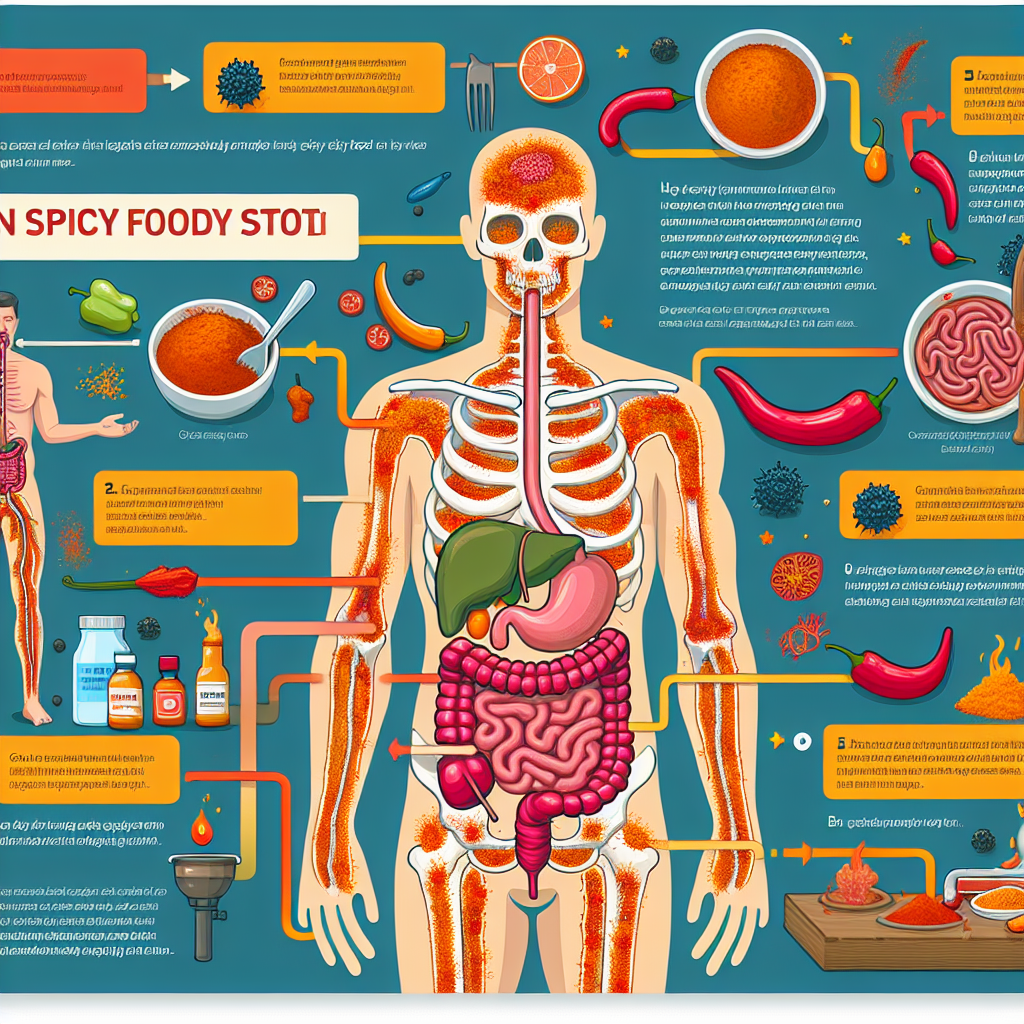Spicy foods are a staple in many cultures around the world, offering a burst of flavor and heat that can turn a simple meal into a memorable experience. However, the impact of these fiery ingredients on our digestive system can be significant. From the moment they enter our mouths to the time they are processed by our gastrointestinal tract, spicy foods can both delight and challenge our digestion.
The Journey of Spicy Foods Through the Digestive System
When we consume spicy foods, the active component that gives chili peppers their heat—capsaicin—interacts with our taste buds and mucous membranes. This interaction triggers a sensation of heat or burning, which is actually a defense mechanism of the plants to deter predators. For humans, this sensation can be pleasurable or painful, depending on individual tolerance levels.
Once swallowed, the spicy elements make their way to the stomach, where they can continue to cause that warm or burning sensation. In the stomach, spices can stimulate the production of gastric juices, which aid in the breakdown of food. For some, this can promote efficient digestion, but for others, it may lead to discomfort or conditions such as acid reflux, where stomach acid leaks into the esophagus.
The Effects on Gastric Health
Spicy foods can exacerbate symptoms in individuals with gastrointestinal conditions like gastritis or peptic ulcers. The capsaicin in chili peppers is thought to irritate the stomach lining, potentially worsening these conditions. If you’re interested in exploring this topic further, Avix Health has a wealth of information on Digestive Health, providing a deeper understanding of how our dietary choices affect our gastrointestinal system.
The Role of Capsaicin in Metabolism and Gut Flora
Interestingly, capsaicin has been studied for its potential benefits in metabolism and weight management. It’s thought to increase metabolic rate and promote fat burning. Moreover, recent research suggests that spicy foods might influence the gut microbiome, contributing to a diverse and healthy bacterial environment. This relationship between diet and gut health is a burgeoning field of study, with significant implications for overall wellness.
Potential Benefits of Spicy Foods
Despite the challenges they may pose, spicy foods are not without their benefits. Capsaicin has been shown to have anti-inflammatory and antioxidant properties. It may even play a role in pain relief by desensitizing sensory neurons. For an in-depth look at how spicy foods and other dietary choices impact our well-being, consider reading related articles such as The Benefits of Omega-3 Fatty Acids for Digestive Health and Strategies to Enhance Gut Flora and Promote Digestive Balance.
Considerations for Those with Digestive Sensitivities
For individuals with irritable bowel syndrome (IBS), inflammatory bowel disease (IBD), or other digestive sensitivities, spicy foods can trigger symptoms like cramps, bloating, and diarrhea. This reaction is due to the activation of certain digestive tract receptors by capsaicin, which can lead to an increase in intestinal motility.
Those with a sensitive gut may find it helpful to learn more about avoiding triggers and managing their conditions through dietary adjustments. An insightful resource on this subject is the article Identifying and Managing Food Intolerances for Better Digestion.
Recommendations for Enjoying Spicy Foods
For those who love spicy foods but want to minimize digestive discomfort, there are several strategies that can help:
- Start with small amounts of spice and gradually increase tolerance over time.
- Pair spicy dishes with dairy products, which can bind to capsaicin and help flush it from the system.
- Consume a balanced meal that includes fibers and proteins to slow down the rate of digestion and capsaicin absorption.
For a more comprehensive understanding of how to maintain digestive health while enjoying a diverse diet, Avix Health’s article on Leveraging Nutrition Therapy for Optimal Digestive Health offers valuable insights.
External Resources for Further Reading
To further explore the effects of spicy foods on your digestive system, consider these niche resources:
- A study published in the Journal of Nutritional Biochemistry on the thermogenic effects of capsaicin.
- The International Foundation for Gastrointestinal Disorders provides information on managing digestive conditions affected by diet.
- Research on the gut microbiome and spicy foods can be found through the American Gastroenterological Association.
Conclusion
The relationship between spicy foods and the digestive system is complex, with both potential benefits and challenges. Understanding how these flavorful ingredients affect your body can help you make informed choices to enjoy them without discomfort. As with any dietary consideration, listening to your body and consulting with healthcare professionals when necessary is crucial for maintaining optimal digestive health.



